There were only two subjects in the whole universe worth knowing: thermodynamics and information theory. Blood cells in a capillary, rioters on Main Street, travelers vectoring some new arbovirus from the Amazon Preserve — life, and its side effects — all the same thing, really.
The only difference was the scale and the label - Peter Watts
Today's word is data visualization. What's that? It's basically the mapping impulse applied to non-geographical areas of space, time and understanding. You take all those dull dry numbers and turn them into an awesome pie chart!
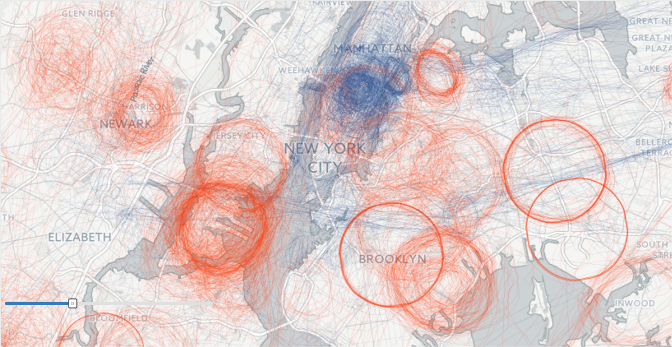
In truth, data visualization is one of the most fascinating fields for a science enthusiast. Like drone photography, it fuses science with art, small details with big picture, pattern with beautiful noise. It comes from the truth that, whatever Emily Dickinson might have thought, the brain is not wider than the sky. Everything we "know" about the world is a shrunken scaled-down abstraction of the actual thing. We don't know every detail of the drive home from work. We know landmarks and string them together, the rest is just streaming wallpaper.
Given all that, you might be taking another look at the top of this article and wondering when I'm going to get to the "maps and money part", yeah? Fair enough. If you've considered the "why" of maps and data visualizations as opposed to the "what" we glanced at above, you already know the answer. Why do we create maps and data visualizations? Because we're trying to gain an advantage over reality or over each other. These days, that advantage is almost always financial.

You see, in the world of today, the true powers are not the obvious marketing juggernauts we see on our screens and pages every day: the Coca-Colas, the Disneys. Nor is it the big huge resource extraction behemoths like Saudi Aramco or Sinopec (but we are getting closer. How many people had heard of Sinopec before reading it sixteen words ago? I only learned of its existence as I typed this paragraph)
No, the true powers are the companies you've never heard of, that you would never hear of if you weren't in the relevant industries or we weren't living in the online age of ever-more thinly split hairs. I speak of the support companies, the ones that provide eyes and ears (and mouths to whisper in those same ears) to the above-mentioned juggernauts, the economic equivalent of the so-called Deep State.
One perfect example of this is Orbital Insight. Unless you happened to have read the same articles I recently read or you're in the hedge fund business (if the latter, scroll down to the bottom of this article and feel very free to send money, you rich m&$&@#er), you have probably never heard of these guys. That's because they are the seers, not the seen and they see everything.
Those of us who have been growing increasingly concerned about surveillance have come to realize we've been frightened of the wrong thing. Big Brother isn't scary, it's Uncle Scrooge we should have been worried about, not the surveillance society but the surveillance economy.
NOPICTURES
Orbital Insight describes what they do as "... Understanding global and national trends through advanced image processing and data science at petabyte scale" and " ... finding truth and transparency in the ever-expanding supply of satellite images." In practice, this means they apply human and machine eyes to the vast quantity of satellite images currently available to the world and relating that data to viable actions that will profit their clients -- who in turn pay Orbital Insight a pretty penny. It's all about finding connections between data points until observation becomes a kind of perceptual magic, where profit is found by deeper and deeper insight into more and more information. Mining the present to sponsor the future.
How do they do this? The best and coolest example of what Orbital Insight does is the oil thing. They can literally look down at satellite images and see how much oil a company has extracted from the ground on a day-to-day hour-to-hour basis? How? By looking at the shadows. What shadows? They look down at oil storage tanks -- and then measure the length of the shadows cast by their lids as the amount of oil in the tank increases or decreases 😱
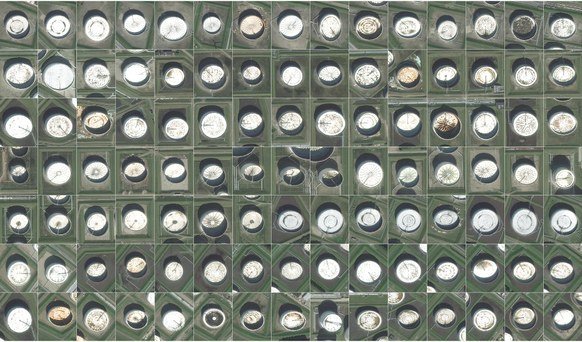
With this alone, they can throw machine algorithms at the data, multiply these ever-changing shadow lengths by the number of tanks they're looking at and spit out precisely accurate numbers on how much oil a company has or doesn't have or has sold or bought. With that, they can predict how much that company will have today or tomorrow or next week and then sell these insights to their customers (other companies trying to get a leg up on the competition or hedge fund investors looking to trade the right stocks at the right moment. Profit all around, as if by access to a particularly mercenary oracle)
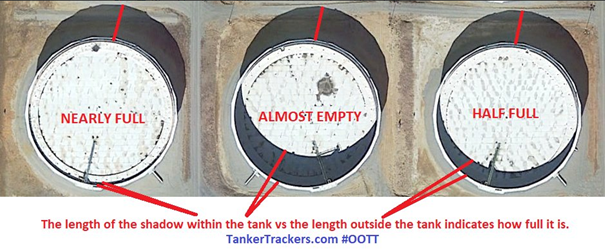
Of course, it's more than just oil. If you really think about the implications of this kind of perception of the world from above and action based on that perception from below, the mind fairly boggles. They count cars in parking lots to extrapolate how much money a mall is making (or losing) They count new roads to extrapolate how many trees are being cut down (or going to be cut down.) They count plots of farmland, extrapolate famines and from there, extrapolate the starter guns of new wars.
Consider how this affects environmental studies, human and animal migration, smart cities, riot prediction -- the list goes on. This is not me speculating, this is what these guys are doing today as you read this sentence.
Next question: just how did they do this? I mentioned machine learning and image analysis algorithms before but truth be told, that's the 'sense-maker' part of the job. What about the 'picture-taker' part? How do they get this much data this easily, with only 30-something employees?
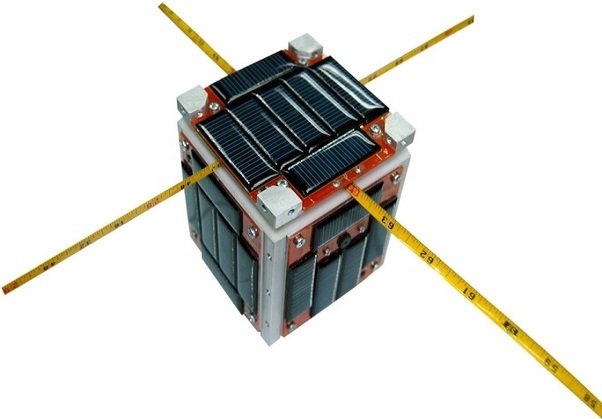
Turns out, it was the open-source-ization and democratization of information access that has blown the world wide-open for anyone paying attention. Cubesat was a big one, allowing colleges and even high schools to create tiny yet powerful satellites and throw them into orbit -- and then making all the pics and video they gather available to whoever wants it. A whole lot of other companies have gotten into that too.
Of course, none of this happens in a vacuum. Money casts a long shadow. The more they know the more they want to know; the tech becomes a runaway train of ever broader surveillance, ever deeper interpretation of the data gathered.
I've said before that money is really mostly a means of allocating attention. When something worth paying attention to shows up, the money will inevitably go there and the vast cool unsympathetic eye of Uncle Scrooge follows. See enough trees and you get the forest, ripples on the water tell you how many fish, you know you're awesome when you've got both Google and NASA on your CV. Welcome to 21st-century natural selection, not survival of the fittest but survival of the better informed.
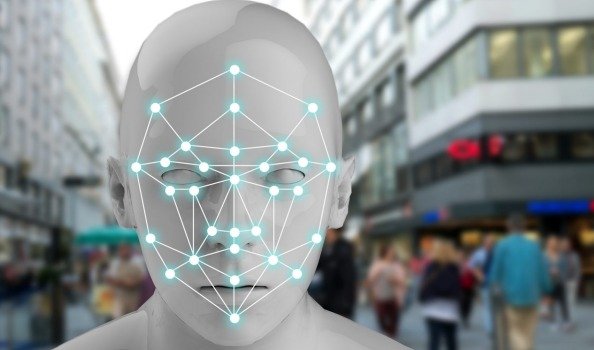
“We’re not marketers,” says Zatreanu. “We want to understand not just you but what people like you are doing.”
All this comes down to prediction, the desire to make the world knowable and controllable. To accomplish that at this level? You don't need individuals but demographics; you don't need humans, you need lines on a graph; you don't need people, you need trends; so you can better give your customers the world -- at scale.
I find myself more and more terrified by the true nature of the world with every passing day.
References
How satellites, drones and planes are making hedge funds money - the article that inspired this whole thing. It's amazing, go read it, seriously.
https://orbitalinsight.com/#slider-1 - The Orbital Insight website because you of course have to go to the source
https://www.fastcompany.com/3067492/why-orbital-insight-is-one-of-the-most-innovative-companies-of-201 - Why Orbital Insight is one of the Most Innovative Companies of 2017
https://www.fastcompany.com/40425808/how-tiny-satellites-are-changing-the-way-we-do-business - How Tiny Satellites are Changing the Way We Do Business
https://flowingdata.com/2016/12/29/best-data-visualization-projects-of-2016/ - Best Data Visualization Projects of 2016
https://www.wired.com/story/how-ai-could-really-enhance-images-from-space/ - How AI Could Really Enhance Images From Space

If you like what you read, far be it from me to stop you from tipping/donating like so (in order of preference):
👇
Steem/SBD: @edumurphy
Dash: XdCpkRRxejck5tfXumUQKSVeWK8KwJ7YQn
ETH: 0x09fd9fb88f9e524fbc95c12bb612a934f3a37ada
NKN: NaAKsxh3SycrXNkbJMxYsvfwWbDteBga8w
Doge: DCbNkisABpx4ngYEqypQaTypzm7rfGwDeL
BTC (if you must): 1L9foNHqbAbFvmBzfKc5Ut7tBGTqWHgrbi


